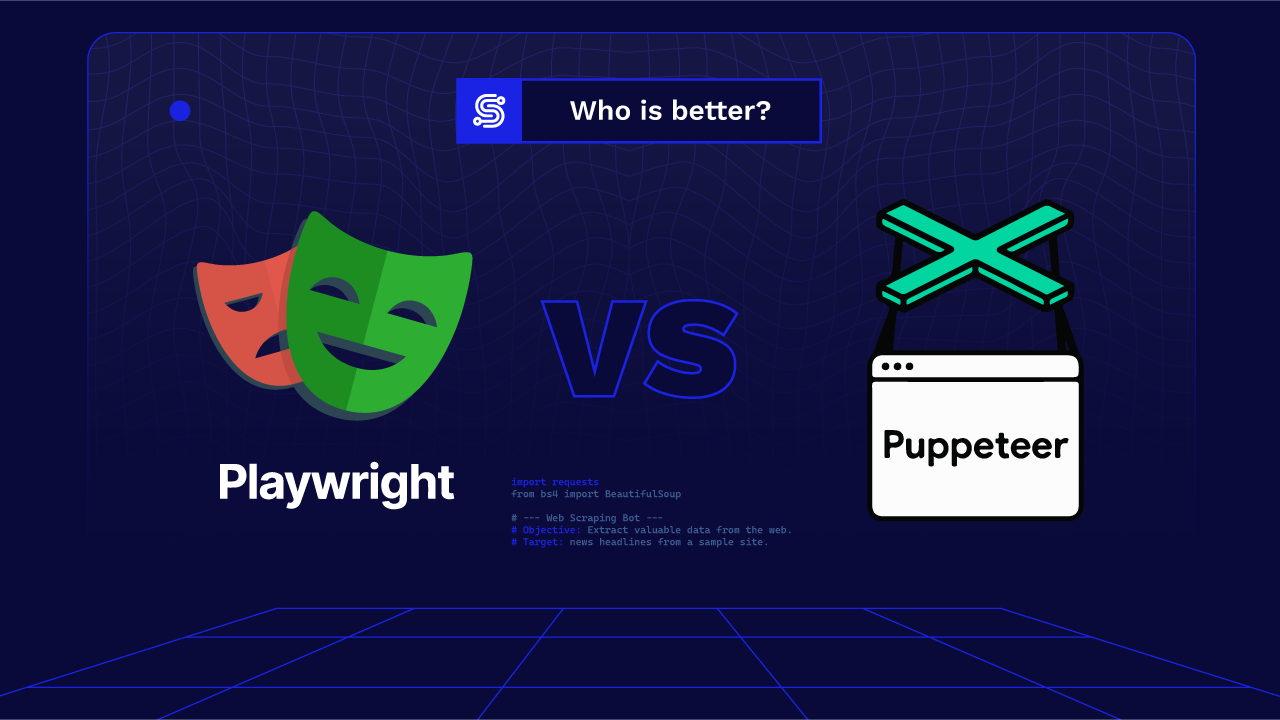If you are working with headless browsers, you’ll likely face a key decision: Playwright or Puppeteer?
Both are great tools for scraping dynamic websites or automating browser tasks, and each comes with a solid reputation and a strong following.
They have, of course, their differences, too, both from a technical standpoint and in terms of ecosystem, support, and overall flexibility. In this short blog, we’ll compare these two popular libraries.
By the end, you’ll have had better understanding of Playwright and Puppeteer, their tradeoffs, and all the information your need to pick the best fit for your project.
What Are Playwright and Puppeteer? Key Features and Differences
Before we delve into the key differences between Playwright and Puppeteer, it is important to understand each one well.
What is Playwright?
Back in 2020, the Microsoft team began to see the need for a single robust API to cross-test browsers. This led to the creation of Playwright.
Unlike many existing libraries, Playwright acts as a unified tool bridging multiple platforms, browsers, and languages. For instance, Playwright supports FireFox, WebKit, and Chromium — the open-source engine behind Google Chrome.
It works on virtually any machine, and supports both headless and headful modes. Mobile-first developers have a soft spot for Playwright because it can emulate Android Chrome and Mobile Safari directly on your desktop. App developers can simulate and test how their applications perform across different mobile environments without needing physical devices.
When it comes to web scraping, Playwright is fitted with a number of ad-hoc features—such as AutoWait, very popular due to its ability to let you scape web pages without setting off bot-detection systems. Playwright also shines in managing multiple tasks at the same time. For example, it can handle testing a number of tabs and user scenarios at the same time without effort.
What is Puppeteer?
Google created Puppeteer in 2017 as a JavaScript library for web testing and automation within its browser ecosystem. It was designed to meet the demand of developers building with Google products.
Puppeteer does not have a native frontend, which means it runs completely headless. However, users can configure it to launch a visible browser.
Since its beginnings, Puppeteer has been popular among developers to test Chrome extensions. Today, with most websites built using JavaScript—often with Next.js on the frontend and Node.js on the backend—many developers still prefer to test their applications using a JavaScript-based library like Puppeteer.-
For end-to-end testers, Puppeteer gives you the flexibility to check everything from the user interface to keyboard inputs. This means you can:
- Make sure your web app performs well
- Test the overall user experience
- Catch anything that might be broken
- Spot security vulnerabilities
When it comes to scraping, this library is popular for the ability to crawl pages, extract data, and capture the results as screenshots or PDFs.
Playwright vs Puppeteer Comparison
| Feature | Playwright | Puppeteer |
| Browser Support | Chromium, Firefox, and WebKit | Chrome and Firefox |
| Cross-browser Support | Available | Unavailable |
| Language Support | JavaScript, Python, Java, TypeScript, .NET | JavaScript |
| Mobile Simulation Support | Available | Unavailable |
| Browser UI | Available | Unavailable |
| Creator | Microsoft | |
| Timeline trace debugging | Available | Available |
| Machine Support | Mac, Windows, Linux | Mac, Windows, Linux |
| Performance | Fast | Fast |
| Community Vibrance | Better | Good |
| Documentation | Good | Better |
When to Choose Playwright vs. Puppeteer?
Now that we have taken a closer look at both Playwright and Puppeteer, let’s see when it’s best to use each, depending on your project and specific needs.
Playwright
Here are some reasons you might want to stick with Playwright.
Multi-language Support
Playwright supports many languages, including JavaScript, TypeScript, Python, Java, and .NET.
Unlike Puppeteer, which supports only JavaScript, you have many options with Playwright. You have the freedom of picking and building with the language you are most comfortable with.
Cross-browser Support
Playwright is the right choice if you want to test your application across multiple browsers. It supports many browsers, such as Firefox, Chrome, and WebKit.
Mobile Simulation
You may be trying to scrape, test, or build a mobile app. Playwright helps you simulate a realistic mobile environment directly from your desktop. Its precise rendering capabilities give you an accurate view of how your application will appear and behave on mobile devices, letting you do more informed development and testing without the need for physical hardware.
Puppeteer
Here are some use cases when Puppeteer might be your best pick:
Testing Chrome Extensions
Puppeteer was built by the Chrome DevTools team at Google, so the tech stack similarities make it a great tool for Chrome extension testing. You are going to have an even better time if you are extensively using JavaScript.
JavaScript is Enough
On the other hand, Puppeteer only supports JavaScript, so projects relying on other languages might be slowed down.
Browser-specific Support is Not Important
If you are testing or scraping with only Chrome in mind, Puppeteer is a good option. Supporting Chrome is no issue at all for Puppeteer, but it might struggle with other browsers.
Playwright vs Puppeteer for Web Scraping: Which One Wins?
Primarily, these libraries are used for web automation and testing. However, many engineers might be more interested in Playwright and Puppeteer’s web scraping capabilities of.
Here is what to keep in mind when choosing between the two for web scraping.
Bot Detection
Most detectors are trained to recognize bots by identifying agents that speedily access a web page and carry on actions even while it is still loading.
Thanks to the AutoWaita feature, Playwright ensures that elements fully load before any action is executed, making it easier to proceed undetected.
While Puppeteer doesn’t offer an equivalent of AutoWait, it also sports similar features that support graceful loading. For example, you can get creative with page.setDefaultTimeout() and page.waitUntil, which allow you to control how long to wait for elements or actions before timing out.
Dynamic Content Handling
Puppeteer was built to handle crawling and data extraction from Single Page Applications.
However, it has a couple of downsides:
- An acute focus on Chrome
- No built-in support for handling dynamic content
If you want to scrape with Puppeteer, you’d have to digest the docs well so you can manually configure it to successfully scrape dynamic content.
For example, you’ll need to write waitFor() methods explicitly, among other things. Playwright, on the other hand, comes with automatic waiting and built-in retries, which help reduce bot detection and minimize errors.
Apart from that, Playwright is better suited for scraping modern websites, especially when it comes to handling iframes. It can reliably access and extract content loaded within them.
Scraping Pre-rendered Content in HTML
There are times you might need to pre-render a web page you want to scrape, probably to avoid API detection or to improve your scraping efficiency.
If you do this often, you’ll need to check which library better supports your workflow.
Puppeteer has native support for fetching pre-rendered content, usually without requiring heavy configuration.
Playwright, on the other hand, doesn’t natively support pre-rendered content, so you’d need to write your own script to handle that.
Conclusion
Playwright and Puppeteer are two good libraries you can use for your web testing or scraping. In this guide, we’ve examined the technical merits and downsides of each one.
It’s important to emphasize that if your goal is web scraping, these libraries alone might not be enough. Modern websites use advanced bot detection and blocking techniques that go beyond what headless browsers can easily bypass.
That’s where tools like ScraperAPI come in. It can help you successfully scrape the web without the usual headaches. Sign up for the basic plan here and see how it works for yourself!
FAQs
Is Puppeteer better than Playwright?
Yes, due to the native stealth plugin, Puppeteer is often better than Playwright for web scraping. That said, Playwright stands out with its cross-browser compatibility and support for multiple programming languages.
Is Puppeteer the same as Playwright?
No, they are two different headless browser automation libraries, each with its own features and strengths.
Is Playwright a fork of Puppeteer?
No, Playwright is not a fork of Puppeteer. It was created by the same team that originally worked on Puppeteer at Google, but they moved to Microsoft and built Playwright from scratch.
Is Playwright good for scraping?
Absolutely. It’s a powerful headless browser library that works well for web automation and scraping. For improved performance and fewer blocks, it’s even more effective when used alongside a tool like ScraperAPI.

